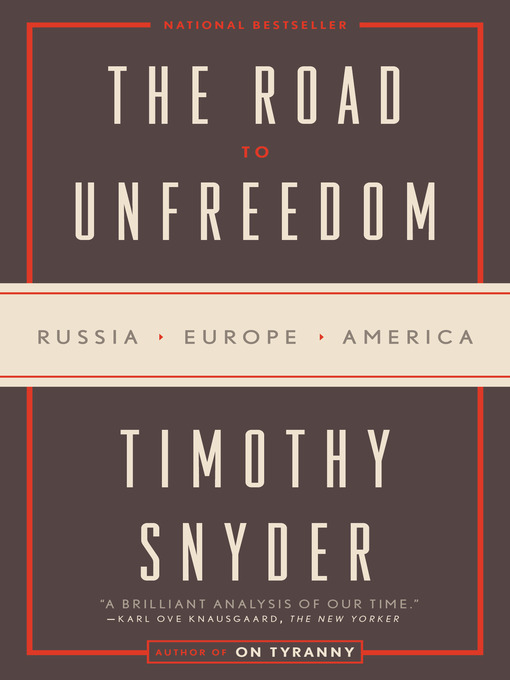
The Road to Unfreedom
Russia, Europe, America
کتاب های مرتبط
- اطلاعات
- نقد و بررسی
- دیدگاه کاربران
نقد و بررسی

November 1, 2017
Celebrated for books such as On Tyranny and Bloodlands, the multi-award-winning Snyder builds on his considerable knowledge of Eastern Europe and the Holocaust to explore the return of authoritarianism today, starting with Vladimir Putin's consolidation of power in Russia. Since then, as he chronicles here, authoritarian tendencies have moved west to Poland and Hungary and have cast a shadow on recent events in the United States and the UK, where deep-seated liberal values are being challenged. Especially relevant as President Trump's ties to Russia are more closely examined.
Copyright 2017 Library Journal, LLC Used with permission.

February 26, 2018
Yale history professor Snyder (On Tyranny) buttresses his denunciation of Donald Trump as a nascent authoritarian with a fascinating, detailed exploration of how recent events in Russia presaged Trump’s administration. Beginning by discussing the obscure early-20th-century Russian philosopher Ivan Ilyin, who regarded “fascism as the politics of the world to come,” Snyder traces Ilyin’s influence on Vladimir Putin’s aggressive efforts to return his country to superpower status. Those included the 2014 invasion of Ukraine, which Snyder considers “the warning that went unheeded” of Russia’s willingness to interfere with other countries’ political systems, as later seen during the 2016 U.S. presidential election. He relates Ilyin’s belief that strong rulers favor self-serving myths over empirical evidence to numerous examples of the Putin regime’s propaganda. In perhaps its most audacious PR coup, Russia’s downing of a Malaysia Airlines flight over Ukraine was spun so successfully that well over 80% of Russians believed their country wasn’t to blame. This instance of “alternative facts” will resonate with many Trump opponents, as will Snyder’s dissection of the leadership style of oligarchs, both Russian and American. His work achieves its stated goal of conveying the relationship among “interconnected events in our own contemporary world history” and will be a must-read for those concerned about democracy’s safety in the 21st century. Agent: Tina Bennett, WME.

March 1, 2018
How Russia's campaign to undermine democracies threatens the European Union and the United States.In a hard-hitting analysis of current events, Snyder (History/Yale Univ.; On Tyranny: Twenty Lessons from the Twentieth Century, 2017, etc.) argues persuasively that Russia under is aggressively working to destabilize Western nations and export "massive inequality" and "the displacement of policy by propaganda." Beginning with the strenuous revival of totalitarian thought in 2011, Russia has widened its efforts to attack the EU and to infiltrate American politics by masterminding the election of Donald Trump. For Russia, the EU, which requires that its member countries are democratic and promote human rights, exists as an affront to its "native kleptocracy." Because "Russian state power could not increase, nor Russian technology close the gap with Europe and America," writes the author, it sought to gain "relative power" by weakening other nations. Using targeted Twitter campaigns, trolls, and bots, Russia manipulated a "lLeave" vote in the Brexit referendum and later directed its attention to working against Emmanuel Macron in France and Angela Merkel in Germany. Snyder chronicles Putin's successful influence in Trump's nomination and election: "a cyberwar to destroy the United States of America." Russian connections to Trump began in the 1990s, when Russian gangsters laundered money by buying and selling apartments in Trump Tower. Trump, who at the time was bankrupt and owed about $4 billion to more than 70 banks, welcomed funds from Russian oligarchs, who bought his properties through shell companies. The author expertly details Russian involvement in the 2016 election by Paul Manafort, who "had experience getting Russia's preferred candidates elected president"; Trump's foreign policy adviser, pro-Putin Carter Page, who became a lobbyist for Russian gas companies; and Michael Flynn. Russian use of Twitter, Facebook, and other internet sources "exploited American gullibility" and cynicism. Freedom, Snyder writes, "depends upon citizens who are able to make a distinction between what is true and what they want to hear."A highly distressing, urgent alarm to awaken Americans to the peril of authoritarianism.
COPYRIGHT(2018) Kirkus Reviews, ALL RIGHTS RESERVED.

























دیدگاه کاربران